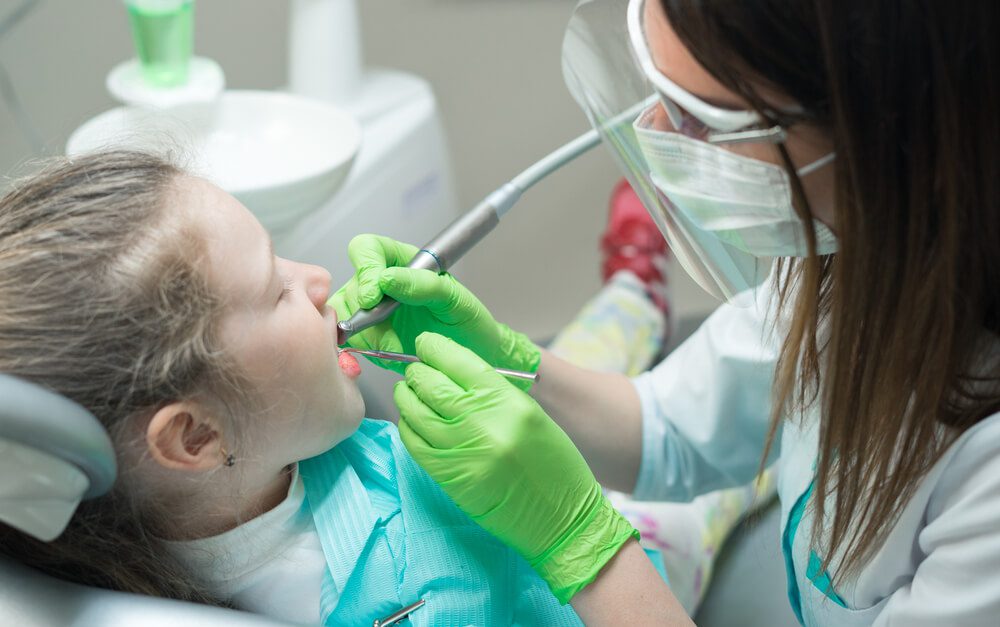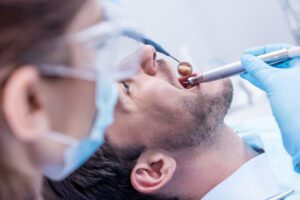Posted on May 25, 2023

Have you ever wondered why people with braces have to take more care of their oral hygiene? Well, the answer is simple- braces make it harder to clean teeth.
If you have been advised to wear braces, there is no doubt that you want to achieve the best possible results. However, undergoing orthodontic treatment requires more than just wearing braces.
Good oral hygiene is crucial to ensure that your teeth and gums stay healthy throughout the treatment period.
Orthodontic treatment is popular among people of all ages. It aims to fix misaligned teeth and jaw problems and involves wearing braces or other appliances that apply pressure to the teeth.
While it’s a great way to improve the appearance of your teeth and bite, it also requires extra care to keep your teeth and gums healthy. Without proper oral hygiene, braces can trap food particles and bacteria, leading to tooth decay, gum disease, and other oral health problems.
Maintaining good oral hygiene is essential when undergoing orthodontic treatment. By following simple steps and incorporating healthy habits, you can keep your teeth and gums healthy and achieve the best possible results.
In this article, we’ll discuss some effective ways to maintain oral hygiene during orthodontic treatment.
Maintaining good oral hygiene is essential, especially during orthodontic treatment. Here are some key points to understand the importance of oral hygiene in conjunction with orthodontic treatment:
 Orthodontic appliances, such as braces or aligners, can create additional spaces for plaque and food particles to accumulate. Proper oral hygiene practices, including brushing and flossing, are crucial for removing this buildup and preventing tooth decay, gum disease, and bad breath.
Orthodontic appliances, such as braces or aligners, can create additional spaces for plaque and food particles to accumulate. Proper oral hygiene practices, including brushing and flossing, are crucial for removing this buildup and preventing tooth decay, gum disease, and bad breath.
Brush your teeth thoroughly at least twice a day using a soft-bristled toothbrush. Pay extra attention to brushing around the brackets, wires, and any other orthodontic appliances to ensure all surfaces are clean. Consider using an interdental brush or a special orthodontic toothbrush designed to clean around braces.
Flossing becomes even more important during orthodontic treatment. Use floss threaders, orthodontic floss, or other specialized tools to navigate around the braces or wires, ensuring you reach all areas between teeth. Regular flossing helps remove plaque and debris from areas that are difficult to reach with a toothbrush alone.
In addition to brushing and flossing, incorporating interdental cleaning tools like interdental brushes or water flossers can further aid in removing plaque and food particles from between teeth and around orthodontic appliances.
Maintain regular dental check-ups throughout your orthodontic treatment. Your dentist can monitor your oral health, clean hard-to-reach areas, and address any concerns or issues that may arise. Regular professional cleanings help keep your teeth and gums healthy during treatment.
Your orthodontist or dental team will provide guidance on proper oral hygiene techniques specific to your orthodontic treatment. They can demonstrate the use of interdental cleaning tools, recommend suitable oral care products, and address any questions or concerns you may have.
By maintaining excellent oral hygiene practices throughout your orthodontic treatment, you can minimize the risk of dental problems, promote a healthy smile, and ensure the best possible outcome.
Consult with your orthodontist or dental professional for personalized advice and recommendations tailored to your specific needs.
Oral care is an essential part of maintaining good health. However, it is often overlooked or neglected. People tend to take their teeth and gums for granted until complications arise. Poor oral hygiene leads to tooth decay, gum disease, and even loss of teeth.
In this section, we will discuss the proper oral care techniques for avoiding complications.
When brushing, hold your brush at a 45-degree angle towards the gum line. Use circular motions to clean every surface of your teeth, including the front, back, and chewing surfaces. Don’t forget to brush your tongue and the roof of your mouth to eliminate bacteria that cause bad breath.
The American Dental Association recommends that you brush twice daily, for at least two minutes each time. Brushing before bedtime is especially important, as you will be sleeping for several hours, leaving your teeth vulnerable to bacteria and plaque build-up. Brushing also helps to remove food debris and prevent bad breath.
Choosing the right toothbrush is crucial to maintaining good oral hygiene. Make sure to select a brush with soft bristles, and replace it every three months or earlier if the bristles have become frayed or worn out. Electric toothbrushes are also an excellent investment as they have been proven to be more effective than manual brushes at removing plaque.
Toothpaste contains fluoride, which helps strengthen your teeth and prevent cavities. Make sure to choose a toothpaste that suits your needs. If you have sensitive teeth, use toothpaste formulated for sensitive teeth. If you are prone to cavities, consider using toothpaste with a higher fluoride concentration.
Flossing is a crucial part of oral care that should not be ignored. Here are flossing techniques that can help avoid complications and promote good oral hygiene:
 Mouthwash is not only a refreshing way to improve your breath, but it also helps to kill harmful bacteria in your mouth and remove plaque buildup.
Mouthwash is not only a refreshing way to improve your breath, but it also helps to kill harmful bacteria in your mouth and remove plaque buildup.
Using mouthwash as a part of your oral care routine can provide added benefits to your dental health.
Choosing the right mouthwash, following instructions, using it in addition to brushing and flossing, avoiding mouthwash with alcohol, and consulting with your dentist are all important steps to ensure proper oral care and avoid complications.
By following these tips, you can maintain good dental health and keep your smile looking bright and healthy.
When undergoing orthodontic treatment, it is important to maintain good oral hygiene to ensure the success of the treatment.
Your diet plays a significant role in keeping your teeth and gums healthy. You should avoid sticky, sugary, and hard foods that can damage your braces and teeth.
Instead, aim for a balanced diet consisting of fruits, vegetables, lean proteins, and healthy fats. You should also chew your food slowly to prevent damaging the braces and brush your teeth after every meal to remove food particles and plaque.
By following a proper diet, you can maintain good oral hygiene during orthodontic treatment and achieve a healthy, beautiful smile.
One important aspect of maintaining good oral hygiene during orthodontic treatment is regularly attending orthodontic appointments. During these appointments, your orthodontist can check the progress of your treatment and recommend any necessary adjustments to your oral hygiene routine.
Your orthodontist may also clean your teeth and braces to ensure that they are free of plaque and food debris. By consistently attending orthodontic appointments, you can stay on track with your overall oral health and ensure that your treatment is progressing as planned.
Maintaining good oral hygiene during orthodontic treatment is crucial not only for straight teeth and a beautiful smile but also for overall health. Braces and other orthodontic appliances can make it difficult to clean your teeth properly, so it is important to be diligent in your oral hygiene routine.
Poor oral hygiene during orthodontic treatment can lead to tooth decay, gum disease, and other health problems. By brushing and flossing regularly, using an interdental brush or water flosser, and avoiding sugary and acidic foods, you can ensure that your teeth and gums stay healthy throughout your orthodontic treatment and beyond.
For comprehensive orthodontic care and guidance on maintaining optimal oral hygiene, trust Smilebliss. Our experienced team is dedicated to helping you achieve a healthy, beautiful smile throughout your orthodontic journey.
Contact Smilebliss today to schedule a consultation and learn more about our services.